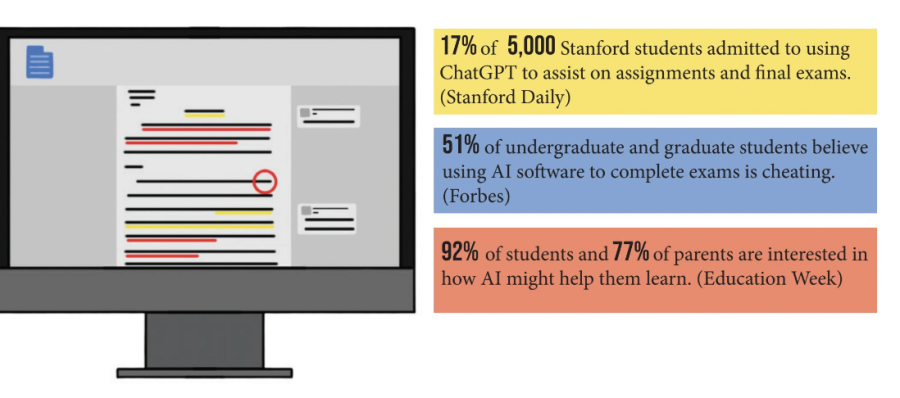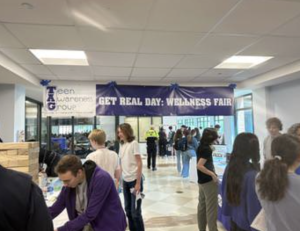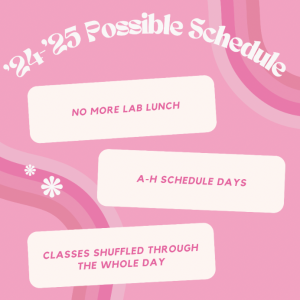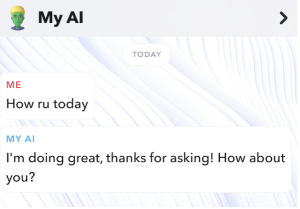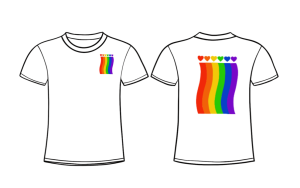Teachers utilize new technology to catch AI-written student essays
Graphic By Shivali Kanthan ’24.
Colleges share statistics about the usage of AI on campus.
Turnitin, a plagiarism detection site, recently released a new update to detect AI-written essays, and teachers have already utilized it to crack down on the influx of AI-usage in Staples students’ work.
Thousands of kids across America have turned to new AI tools such as ChatGPT to aid them with completing tedious homework assignments or more extensive projects, such as essays. According to a poll in an article published by USA Today, “22% of students use the chatbot to help them with coursework or in extracurricular activities on a weekly basis.”
This trend is seen at Staples, as students’ screens flicker between assignments and the AI tab, and more teachers are questioning the authenticity of submissions.
“The new AI kind of freaks me out, and I’ve definitely seen a lot of kids using it at Staples and in my different classes,” Molly Whittle ’25 said. “I’ve used it mostly to summarize articles. I feel like it is kinda a way to have the thinking of assignments done for you, and it is definitely convenient if you are in a time crunch. But, on the other hand, I am not sure if using ChatGPT is worth it because of Turnitin.com.”
The website, among other copyright detection services, recently unveiled its ‘AI Innovation Lab’ on April 4. The new section of the website allows them to detect percentages of pieces written by technology, and relay that information to teachers.
“AI writing tools are developing at a rapid pace and so is Turnitin’s technology to detect these emerging forms of misconduct,” Turnitin wrote in a statement. “Our model has been trained specifically on academic writing sourced from a comprehensive database. As a result, Turnitin is more tuned to finding instances of potential dishonesty in student assignments.”
More and more teachers at Staples, including Mary Hockings, have caught their students using Turnitin. However, prior to that additional screening, teachers had already noticed signs of AI writing in their students’ work.
“I have [been suspicious] sometimes if a student’s submission reads drastically differently than the pieces they’ve turned in previously,” Hockings said. “Students tend to have a particular voice or manner of writing, and the AI’s robotic or formulaic voice sometimes comes across differently.”
The temptation of using AI and quickly relieving oneself of a long assignment lures many students into a habit that can damage their free thought and learning development. Some assignments are meant to be struggled through, and AI takes away a valuable lesson.
“As a former high school procrastinator, I can definitely see the temptation to use AI to turn out a piece of writing right away,” Hockings said. “However, I think more is lost. We’re handing over our critical reasoning and communication skills to a technology that we don’t know we can fully trust. I think turning over the power of creation and academic thought to a machine is a step in the wrong direction.”
As educators, the shared initial reaction with ChatGPT’s debut was one of fear and worries in regards to student’s misuse and for the future of what it means to be an educator.
“An article came out that said it was the end of the English department,” English teacher Kim Herzog said. “A lot of teachers were scared that if students start relying on this program, they are not going to think for themselves and actually learn really critical skills that apply beyond the English classroom.”
Not only does the consequences of using ChatGPT entail loss of critical skills both as learners and citizens of society, but it can also have weighty repercussions in regards to Staples’ Academic Integrity Policy, located in the Student Handbook. A few policies in which AI usage could be implied include using unauthorized materials to complete and exam or assignment, attempting to represent someone else’s work as your own, quoting another person’s work without acknowledgement of the source or using resources on a task meant to be completed without resources.
“Teachers have been able to work within the parameters of the Academic Integrity process to engage students in discussions, look at writing history and more as they have determined fair and appropriate consequences,” English department head Holly Sulzycki said. “But in general terms, English teachers have found the work generated by AI to be fairly generic and lacking in authentic voice evidenced by students on other writing tasks within the course.”
With the continuation of development in the AI industry, it is important for students to remember the value in completing their own work, regardless of the time or struggle it may put them through. AI can sometimes fail to address assignment prompts or expectations, lead to repetitive behavior, and the punishment if caught can be drastic to one’s record. Most importantly, it dilutes the importance of classes and assignments in departments such as English or history.
“ChatGPT and similar AI measures take away from the art, beauty, and science of what we do. I hope that teachers continue to use Turnitin.com and its features to hold students accountable,” Hockings said. “ I’d rather have students hand in work that is not their best or ask for an extension and take a late penalty than hand in something that isn’t theirs. It’s disappointing.”
However, the temptation of AI is strong and growing, and teachers have to work with kids to combat the potential of misuse and aid them in working in the right direction. Some think this will come from ignorance or banning of the technology, whereas others, such as Herzog, think adapting to the technology will allow for proper use of this educational crutch.
“The more I think about it, I think it could help to a point, but it will never replace a human mind. We are going to have to be more creative in the ways in which we do things,” Herzog said. “We need to think about how we can use it as teachers as a way to support our teaching rather than fear it, because it will not be going away and will most likely be getting better in the future.”
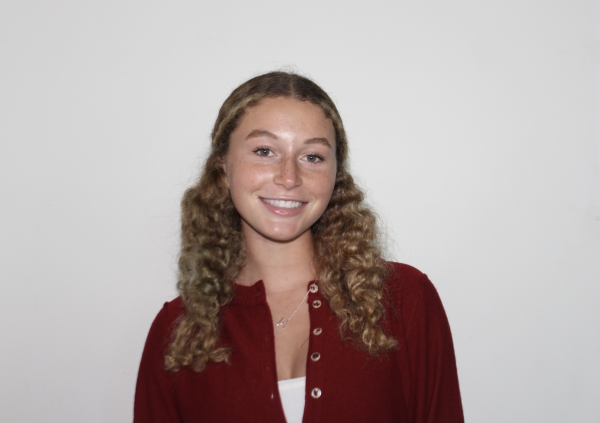
Editor-in-Chief Nina Bowens ’25 has found a passion for journalism through Inklings. She has worked on Inklings since her sophomore year, and may pursue...












































